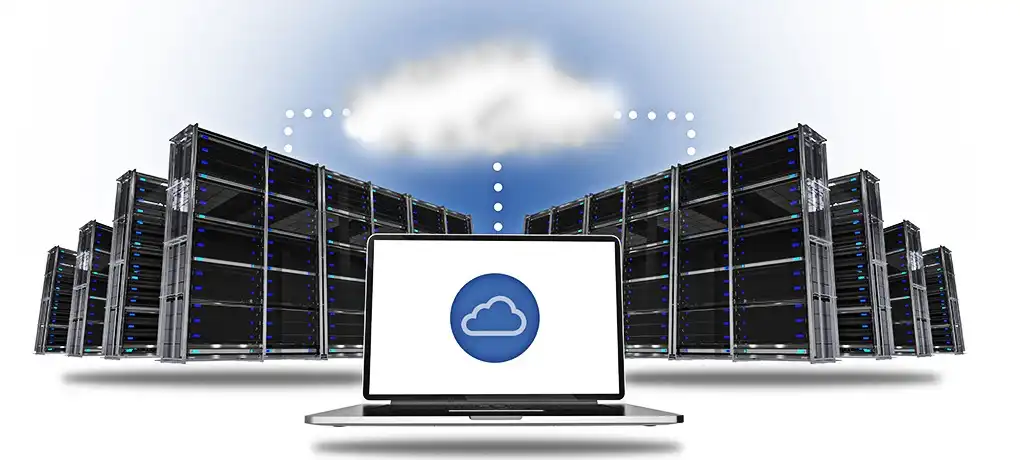Choosing the type of hosting for enterprise software is a crucial decision business owners have to make when embracing digitalization. Cloud hosting and on-premise hosting have their own set of advantages and disadvantages that determine their best use cases. Learn about the main differences between the two hosting types to decide on the ideal hosting for your software solution.
Cloud Hosting vs. On-Premise Hosting
When looking at market trends, there’s an uneven distribution of on-premise solutions vs. cloud-based software—1.9% CAGR and 16.2%, respectively. According to a forecast made by Gartner, the adoption of cloud-based services is projected to grow exponentially in upcoming years. Looking at these trends alone would suggest going with the cloud is the right direction; however, on-premise solutions remain relevant across organizations of all sizes and types.
In fact, only a thorough assessment of your business needs and requirements—not market trends—can reveal which hosting type is a better fit for your organization.
Deployment
- Cloud-based solutions are hosted on third-party servers and accessed by the client via web browser.
- On-premise software requires its own infrastructure, with servers and storage at the client’s company.
In a nutshell, the difference lies in the location of the data. Depending on compliance requirements, organizations may employ cloud-based solutions or invest in on-premise infrastructure.
Implementation
Cloud-hosted solutions take a lot less time to implement, allowing companies to use the software soon after purchase and necessary configuration.
On-premise software requires more implementation time because the infrastructure needs to be properly installed and configured on-site.
Cost: Infrastructure
Because they are deployed on third-party servers, cloud solutions don’t generate additional costs for infrastructure and later maintenance of the server environment.
With on-premise software, companies without their own server infrastructure will incur significant expenses to set up the proper environment (power, space, resources) before being able to use the new technology.
Cost: Licenses
Cloud solutions operate on a variety of pricing models. Usually, the subscription plan is based on any of the following variables: per user, per month, per year, per data usage, etc. The downside of subscription-based licensing is that there’s no guarantee the price will stay the same from year to year.
The pricing model for on-premise software is usually a one-time payment for the license. The drawback is that the license cost can be significant.
Support
Maintenance and support costs are included in the subscription with solutions hosted on the cloud. The cloud provider takes care of the updates, upgrades, and support queries.
For on-premise hosting, there has to be a dedicated IT team to maintain the system and the infrastructure to ensure undisrupted service availability and installation of updates.
Control
With cloud hosting, data ownership is often a tricky matter requiring a thorough analysis of vendor policies to ensure the cloud software adheres to compliance laws.
On-premise solutions offer an unparalleled level of control over data to organizations. Not having to share important data with third parties is especially important in highly regulated companies, for example, in governments or non-profits.
Security
It’s the vendor’s responsibility to ensure high-level cybersecurity measures for cloud solutions—the key to choose the right cloud hosting provider is to assess the vendor’s security practices and protocols.
Security is in the hands of the customer with on-premise hosting. The actual level of data protection thus depends on the security measures implemented at the organization and the technology used to secure the data. The benefit is that the data is stored in one location to which access can be strictly controlled and monitored.
Customization
Cloud solutions have limited customization options that usually depend on the agreement between the vendor and the organization. With fewer customization options, however, the system gains on stability and timely updates.
On-premise hosting solutions can be freely customized as per company needs. In conclusion, the downside is that customization of the system can increase implementation time. Which will cause issues when the vendor introduces significant upgrades to the software.
Access
Cloud solutions can be conveniently accessed from any registered and authorized device with an internet connection. In addition, some vendors allow offline access so that you can work on important documents when the connection is limited.
With on-premise hosting, the situation is more complicated as connecting to the software requires additional solutions that provide a secure connection, without the need to expose corporate networks.
Best Use Cases
Cloud hosting: With lower entry costs and higher ease of access, cloud-based solutions are a good fit for small and mid-sized organizations. Also, startups will also enjoy the demand-based flexibility and lack of need to invest and maintain proprietary hosting infrastructure.
On-premise hosting: With more control over data and better customization, on-premise hosting works well for enterprises with existing hardware resources and bigger budgets to maintain the infrastructure.
If you’re not sure which hosting type is better suited for your business, don’t hesitate to reach out. If you’re looking for a board management software, Convene might be the solution for you. We’ll analyze your needs closely and help you determine the best possible solution. It complies with the regulations put on your organization.
Jess is a Content Marketing Writer at Convene who commits herself to creating relevant, easy-to-digest, and SEO-friendly content. Before writing articles on governance and board management, she worked as a creative copywriter for a paint company, where she developed a keen eye for detail and a passion for making complex information accessible and enjoyable for readers. In her free time, she’s absorbed in the most random things. Her recent obsession is watching gardening videos for hours and dreaming of someday having her own kitchen garden.









